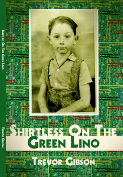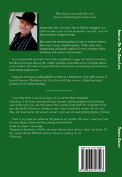Shirtless on the Green Lino
A review by Jean Jenkins. BA Hons: Former Senator for Western Australia.
It was a pleasure and a privilege to launch Trevor Gibson’s memoirs Shirtless on the Green Lino at the WA Art Deco Society’s recent AGM and to have the opportunity to ask Trevor directly some questions about his book and how he came to write it, and to hear his response to questions put to him by Art Deco Society members.
I found Trevor’s memoirs a real page turner and particularly engrossing as they cover the same era as my own life, although I must admit to being a year or so older and brought up in a different country and under different circumstances. In Perth from the early ‘70s on, we are on an equal footing.
In addition, I enjoyed his book on a few levels: the picture of a childhood in Perth in the 1940s and ‘50s; the rebellious teenager of the ‘50s and early ‘60s, contemporary with Elvis Presley and the Rock ‘n Roll scene; evocative snapshots of an earlier Perth such as the steam-powered Perth to Fremantle railway; trams and trolley buses; Prime Minister Menzies declaiming from the back of a truck in Forrest Place; the bustle of preparations for the 1962 Commonwealth Games; and synonymous with this, the development of Trevor’s music career, beginning in Perth and taking him to Sydney, Bangkok, Vietnam, London and finally back to Perth.
Throughout it all we have the personal story of the little boy photographed on the front cover, who looks wistful and a little bit cheeky at the same time, and who is surrounded by a picture of green lino typical of the ‘40s and ‘50s. Trevor’s reminiscences allow us to accompany him through a childhood dominated by a mother who couldn’t show affection through to the adult who found refuge, and ultimately a career, in music and song-writing.
The depictions of a childhood blighted by a mother’s cruel words and actions are vivid, with chilling direct quotes:
“You stupid oaf, you never do what I tell you to do, always want to do it your own way”.
“You’re just a dumb useless child, a no hoper, why I ever brought you into the world I’ll never know”.
“Now get into your room, you little ratbag, you can forget about tea”.
The cruelty was not restricted to words and we read descriptions of a vicious slap on the face, a bashing with a saucepan and even spitting in the face.
Trevor the child’s relationship with his father is more complex; on the one hand there is the little boy’s admiration of the father who tells him stories of his courageous deeds during World War 11 and who takes him to the bush for pleasurable escape, and on the other the hurt after enduring a shockingly cruel punishment.
Somehow, music provides the antidote to the vicissitudes of childhood. From playing the piano at school assemblies, the youthful Trevor progresses to landing gigs in various Perth locations which will be nostalgically recognizable to many. There is the progression from rock ‘n roll to jazz, and the ultimate decision to ditch the day job of public servant and begin the career of a professional musician as the member of a band with a 6-month contract in Bangkok.
And from there to being conned, together with his dancer wife Jan, into entertaining troops serving in Vietnam and then onto swinging London of the ‘60s and multifarious experiences.
I will let readers discover for themselves the more personal details of Trevor’s life, of his marriage and experience of fatherhood. Suffice it to say that 'Shirtless' gives an honest appraisal of that aspect of the memoirs.
The book is punctuated with the words of Trevor’s songs, some quotations from child psychologist Alice Miller’s book The Drama of Being a Child and by some of the teachings of Buddha. It’s a continuous reminder of the child always within ourselves: “Outwardly I had all the signs of success: the suit with the red lining, the car, the girl, but it was all chocolate topping, underneath I was crumble. I couldn’t understand why my mother hated me so. I don’t recall burning the house down.”
Some descriptions of an earlier era stand out particularly, like that of King’s Park: “Sometimes we pedalled over to the War Memorial. Situated at the peak of Mount Eliza, it presided over the blue panorama of the Swan River, the city and the distant Darling Ranges. In the foreground the reflection of art deco buildings rippled in the water. It was a view we never tired of. To prevent soil erosion, the limestone cliffs directly below the War Memorial were planted with grapevines and some fig trees……………………………We moved further down the slope through Bernie’s car park to Mounts Bay at the bottom. The smell of hops from the old Swan Brewery wafted around the corner, a trolley bus went by.”
Many other descriptions fascinate. While working as a public servant for a few years after leaving school, Trevor spent some time in the Records Department of Fremantle Gaol where he came face to face with the notorious serial killer Edgar Allen Cook when he was brought in as a prisoner.
Art Deco members will appreciate Trevor’s description of how changed he found Perth when he returned in 1973 after being away for six years:
“The next day I went into Perth City to revisit the old patch. Hay St had become a mall. Where the traffic used to roar, people were walking in flares and platform soles. All around were pedlars, buskers and beggars. The street and the people that I once knew so well had vanished. I was a stranger. The huge gap between then and now would need closing. I wandered down London Court to St George’s Terrace; half the buildings had been demolished. Concrete, steel and glass monoliths had replaced the beautiful colonial and art deco architecture.”
There is such a treasure trove of snippets of descriptions of life in Perth in past times, such as the horse-drawn milk cart and the early morning daily milk round; a visit to the dentist and treatment with a bone-shaking drill with no pain relief; swimming in the Crawley baths; a parade of floats through the streets of Perth in 1951 to commemorate 50 years since Federation; a country dance at Bencubbin which ends with everyone standing to attention for God Save the Queen; a trip on the ferry to Garden Island in its pre-Defence days; a boat going to Rottnest, with smoke coming from its funnel; first day of school at Subiaco Primary School and later being a student in Perth Boys School in James St, now a part of the Art precinct.
All in all, Shirtless on the Green Lino is a delight to read and a fascination for Perth residents past and present and aficionados of the local music scene.
To purchase a copy of "SHIRTLESS ON THE GREEN LINO", please either email, phone, or use the enquiry form on the Contact Page.
Click Here to go to the Contact Page
The cost is $18.95 plus $4 postage.







